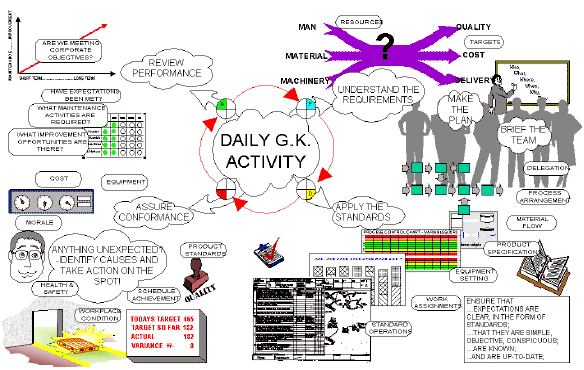What are the benefits of Genba Kanri?
The trouble is that when we try to establish what it is we are trying to improve there is often no data! There are usually targets - which are regarded as something to aim for rather than a clear 'given' expectation - but they are often not achieved. 'Well, we do our best, but they're only targets!' is the usual attitude. There are all sorts of things which stop people achieving what is expected of them: breakdowns, staff absence, material delivery or quality problems, etc. When we take a look at the real situation on the shop floor to take that as our starting point, people say, 'Don't look at me, I'm not normally on this job', 'This machine is playing up today', 'We normally make this product on that line over there', 'These parts are from a different supplier' etc.
OK, so we ask, 'How were you trained to do this job?', 'How is the machine supposed to be maintained, set and operated?', 'How do you change the line over?', 'What is the specification for the components?', and so on. We are considering:
If we conduct a Workshop in an environment like this we are almost certain to make significant improvements - but we cannot be confident that they will be sustained. If there is nothing to assure that equipment is going to be maintained, then reducing lead time and WIP, for example, will probably lead to a machine breakdown instantly stopping an entire process. If there is no system for Quick Response Quality Control then again the process will grind to a halt when deviations occur. If there is no appreciation of Standard Operations, and means of training people in them, everyone will continue to propagate their 'own best way' of doing the job. When it comes to changing the machine or the line over we'll not be able to find the required tools and equipment because there is no 5C appreciation.
